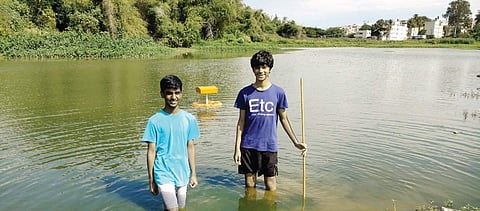

BENGALURU: Two high school students from the city have developed a system of monitoring water quality in lakes in real-time with the help of sensors that send data to your mobile phones.
Pranav Shikarpur and Siddharth Vishwanath are class 11 students of the Bangalore International Academy who started working on the project around 10 months back. They conducted preliminary surveys in six lakes - Putenahalli lake, Kagadasapura lake, Hulimavu lake, Allahalli lake, Jakkur Lake and Chunchagatta lake. Sensors float in the lake that pickup three basic parameters of purity namely electrical conductivity, dissolved oxygen and pH.
Pranav explains that the levels of oxygen determine whether or not they can support aquatic life. “The ideal level is 5 mg/l (milligrams per litre). In Alahalli lake where there are no fishes, our research showed that the oxygen level is around 0.7 mg/l. Electric conductivity is basically the number of ions that are present in the lake that can support aquatic organism. Finally, the pH levels are the levels of acidity or alkalinity of the water,” he adds. The device will also measure air and water temperature.
An arduino microcontroller (an open-source hardware and software programming platform) is used to collects data from sensors and sends the data to an android application, through SMS. They will also host the details on an loT data website www.thinkspeak.com. “The website hosts all kind of IoT data and anyone can view it and be aware of the quality of the water in the lakes in their area. As we have found out numerous groups adopting lakes to take care of them. They have no tools to monitor how their work is having an effect on the lake,” says Pranav.
While there are similar products in the market, however, most according to Pranav cost as much as Rs 12 lakh.”Our system will cost 1 lakh. The reason that commercial devices cost so much is due to additional sensors that monitor more parameters such as phosphates and nitrates. These lead to the shooting up of the prices. Our device merely warns people to take action early on through the three parameters” he says.
The team recently won first prize at The Amateur Scientist 2017 contest organised by the PES University in the science projects category. People who want to know more about the project can go to the website: www.testingwaters.co.in or send their queries to info@testingwaters.co.in
“We are still in the process of further developing the device and will hopefully come out with a final product very soon,” adds Pranav.